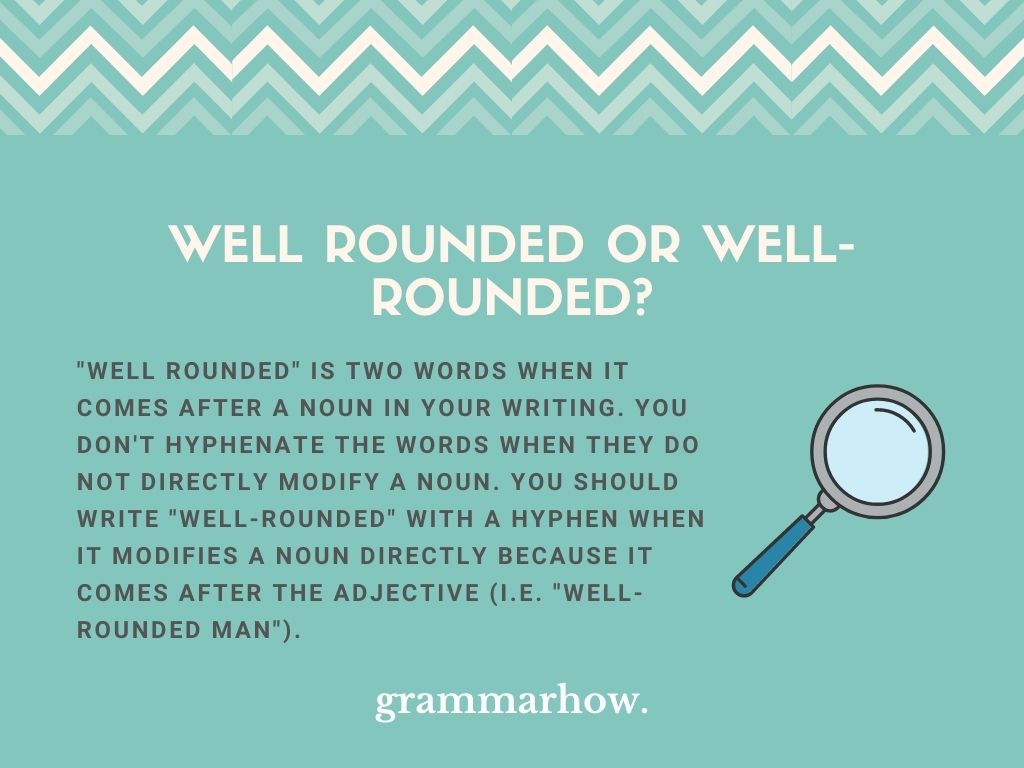Compound adjectives come in hyphenated and unhyphenated forms depending on their placement. We’ll help you understand how “well rounded” and “well-rounded” are used in different contexts.
You’ll know everything about hyphens by the end of this.
Well Rounded or Well-Rounded?
“Well rounded” is two words when it comes after a noun in your writing. You don’t hyphenate the words when they do not directly modify a noun. You should write “well-rounded” with a hyphen when it modifies a noun directly because it comes after the adjective (i.e. “well-rounded man”).

According to AP Style, you should use hyphens as linkers. This means that more than one word is linked together when the same noun is modified. These grammar rules only apply when the noun comes directly after the compound adjective.
- I am a well-rounded professional.
You might find the same sentence worded differently, meaning the noun comes earlier. When this happens, the compound adjective needs no hyphen:
- That professional is well rounded.
The hyphen form is becoming more popular today, though. You might find that “well-rounded” is used more even when it falls after the noun.
Is “Well-Rounded” Hyphenated?
“Well-rounded” is very common in its hyphenated form. It is a compound adjective connected by a hyphen, and it modifies a noun that comes straight after it in the sentence.
For example, you might see “well-rounded person” or “well-rounded education.” In both cases, “person” and “education” come after the compound adjective.
- You are a well-rounded individual. I appreciate all your hard work.
- You have well-rounded knowledge. You’ll be very useful for our trivia team.
The hyphen is used to show that both “well” and “rounded” need to modify the word that comes next.
Without the hyphen, you’re left with:
- Well rounded person
Here, only “rounded” modifies “person.” This could mean that the person is physically “round” rather than having many skills to make them “well-rounded.”
Is “Well Rounded” Two Words?
“Well rounded” is correct as two words, but it’s becoming less popular as English evolves. You’ll find that “well rounded” is two words when it comes after the modified noun.
AP Style only teaches us that hyphens come between words when the noun comes after. AP Style suggests leaving words unhyphenated when the noun comes first because the meaning is already clear enough to the reader.
- I do not know what makes him so well rounded. I guess we’ll find out eventually.
- Her understanding is well rounded. I think you should consider her as an option here.
Is “Wellrounded” One Word?
“Well-rounded” might be correct as two words or hyphenated, but there’s one form that makes no sense. You should not remove the hyphen and leave “wellrounded” as one word.
This form is grammatically incorrect. While some compound words allow the hyphen to be removed, the rules associated with this do not apply to “well-rounded.”
Well-Rounded or Well-rounded?
Different stylebooks have different capitalization methods when including hyphenated forms in titles.
In most title styles, “Well-Rounded” is correct, capitalising both words. This helps to keep the word in line with the rest of the capitalized nouns.
In AP Style, “Well-rounded” is correct. The hyphen treats both words as one word, meaning only the “W” is capitalized as it’s the first letter.
The same rules do not apply when the hyphen is removed. “Well Rounded” is the only correct capitalization method when including the two-word variation in any title.
Conclusion
You should use “well-rounded” and “well rounded” based on where they fall in your writing.
“Well-rounded” has a hyphen when it comes before a modified noun. This is true according to AP Style rules, where the hyphen creates a link between the words.
“Well rounded” has no hyphen when it comes after a modified noun. The hyphen is not required because the modification is clear.

Martin holds a Master’s degree in Finance and International Business. He has six years of experience in professional communication with clients, executives, and colleagues. Furthermore, he has teaching experience from Aarhus University. Martin has been featured as an expert in communication and teaching on Forbes and Shopify. Read more about Martin here.
